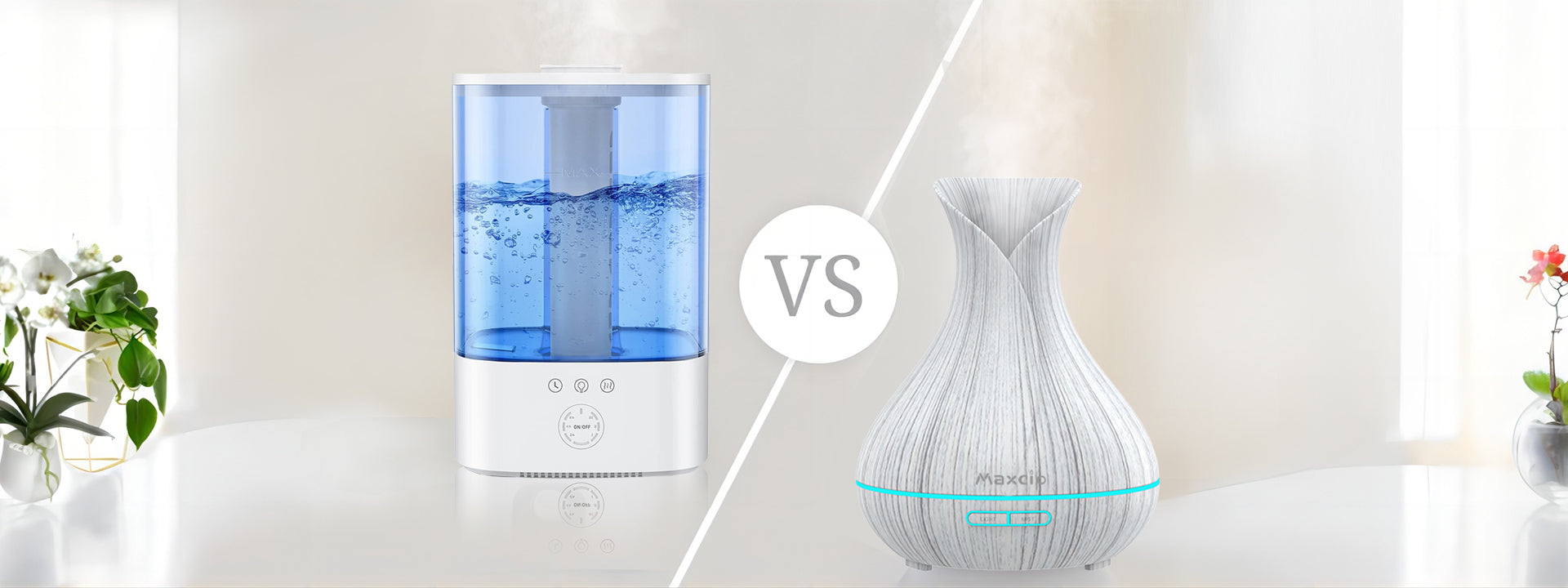Diffuser vs Humidifier: Which Is Better for Your Home
If you're wondering whether a diffuser or humidifier is better for your home, look no further! This blog post will compare the two and help you ...
High air quality is a super underrated condition to have in the home as it improves sleep, skin, mood, and the overall feel and comfort of the home. In fact, experts at Scientific American relate that we spend 90 percent of our lives indoors, so air quality should be of utmost importance - but what can you do to improve the air quality in your home? Well, to start, you can consider two devices: aroma diffusers and air humidifiers. In this article, we're going to discuss diffuser vs humidifier: which is better for your home? Let's start by taking a look at the differences between diffusers and humidifiers.
What's the Difference Between a Humidifier and a Diffuser
To put it simply, the main difference between a humidifier and a diffuser is that a humidifier is used to add moisture to the air of a room and does not affect the smell, whereas a diffuser is used to add fragrance to the air of a room and does not affect the humidity.
There are a few other differences between humidifiers and diffusers which we have outlined in this table:
Differences Between a Humidifier and a Diffuser
|
Humidifier |
Diffuser |
|
Increases the humidity of a room |
Adds fragrance to a room |
|
Provides relief of comfort caused by dry air, like itchy skin, chapped lips, stuffy nose, etc. |
Provides aromatherapy and covers strong undesirable smells |
|
Water is dispersed in the form of a fine mist to increase humidity |
Water and essential oil solution disperses in the form of a fine mist to add fragrance |
|
Water tank can hold up to 3 liters of water |
Water reservoir holds less than 500 ml |
What Is a Diffuser
A diffuser is a device that adds fragrance to the air of a room by dispersing a fine mist of water and fragrance oil.
How Does Diffuser Work
A diffuser works by creating tiny water and oil particles through ultrasonic vibration which are then diffused into the room as a fine mist. The process varies slightly depending on the model of the diffuser, but usually, you add essential oil to the water directly or install an oil capsule. When the diffuser is turned on, a small disc or plate inside the diffuser will vibrate at an ultrasonic frequency, causing the water and oil to form ultra-tiny droplets and will subsequently be blown out of the diffuser's "mouth" as a mist; this can be either a warm or cool mist, depending on your diffuser.
Types of Diffusers
There are seven types of diffusers:
- Ultrasonic Diffusers. Currently the most common and recommended type of diffuser. Ultrasonic diffusers use ultrasonic vibration to dispense fragrance as a therapeutic mist.
- Candle Diffusers. Oil heated by a candle and diffused into the room. Decorative and warm design, no electricity required.
- Electric Heat Diffusers. Heats fragrance oil with electronic conduction to dispense aroma into the air.
- Evaporative Diffusers. Evaporative diffusers use a fan to blow the scent of the aroma oil into the air.
- Reed Diffusers. Wooden sticks or reeds placed into a bottle of essential oil; the oil travels up the reed and diffuses into the air once it reaches the top.
- Nebulizer Diffusers. Breaks down oil into airborne particles which diffuse and disperse into the air more effectively. Nebulizers emit 100 percent essential oil mist.
- Terracotta Diffusers. Oil is placed into a porous terracotta pot which absorbs the oil over time and provides a more subtle hint of fragrance to the room.
Diffuser Pros and Cons
There are several potential health benefits to using essential oil diffusers, which is likely why they have become so popular in recent years. That said, there are a few drawbacks that you should be aware of before you invest in one.
Diffuser Benefits
- Relaxes the Body. One of the most sought-after effects of essential oil diffusers is their aromatherapy benefits. Essential oils have been scientifically proven to induce relaxation in the body. Particularly, rose and peppermint oil have terpenes which, when breathed in, will cause your muscles to relax and tension to melt away.
- Calms the Mind. Just like how some aromatic oils can relax your muscles, additional benefits of diffusers include stress-relieving effects on the mind. Lavender oil is especially effective at slowing down the mind and helping reduce anxiety.
- Helps You Sleep. It has been proven that, when a room is inoculated with an essential oil like chamomile, you will sleep much better and wake up feeling more refreshed than you otherwise would. This is because chamomile oil possesses compounds that have sedative qualities, so when you diffuse its oil into your room with a diffuser, you're ensuring that your body has constant access to this natural sleep aid.
- Soothes Aches and Pains. You can still get pain relief from the aroma of essential oils emitted by diffusers. Marjoram oil is excellent for easing muscle spasms and tension, and also has anti-inflammatory properties.
- Improves Mental Health. Although you shouldn't rely on it to boost your mental health, essential oil diffusers can provide an overall sense of well-being and a natural boost of anti-depressants. Oils like that of ylang-ylang and bergamot are particularly good for helping to improve one's mood.
Diffuser Disadvantages
- Low-Quality Diffusers and Oils Can Have Harmful Effects. Since diffusers disperse oil particles into the air, some people have concerns about the effect this can have on the lungs. Although there isn't any medical or scientific evidence that indicates diffusers can be harmful to the lungs, it's best to play it safe and get a high-quality diffuser that produces ultra-fine airborne particles, like Maxcio's Aroma Diffuser, and use filtered or distilled water. You can also just use the diffuser when you are not in the room and enjoy the aroma after the mist has been completely dispersed into the air.
- All Natural Oils Can Be Expensive. Essential oils are the products of a pretty long and labor-intensive process which makes them more expensive than synthetic varieties. The problem is that they are more expensive, but synthetic oils won't have the same aroma therapy benefits as all natural essential oils.
- Allergies. Some people can have allergic reactions to the oils used in diffusers. If you are unaware of any allergies, but start to get allergy symptoms, like itchy eyes or trouble breathing, turn off the diffuser and consult a doctor.
What Is a Humidifier
A humidifier is a device that increases the humidity of a room by dispersing water droplets into the surrounding air. In doing so, a humidifier helps to soothe uncomfortable symptoms that can arise from dry air conditions, such as dry skin, chapped lips, nasal congestion, and a number of other skin conditions.
How Does Humidifier Work
There are several types of humidifiers, all of which achieve the same effect through different means. In a nutshell, humidifiers work by dispersing the water stored in their water tank into the air in the form of a cool or warm mist which will then evaporate naturally and ultimately increase the humidity of the room.
Types of Humidifiers
There are 5 different types of humidifiers:
- Ultrasonic Humidifiers. Ultrasonic humidifiers create water droplets with a vibrating disc and disperse them as a fine cool mist with the use of a silent fan.
- Evaporators. Evaporators raise the humidity in the room by blowing a water-saturated wick or belt with a fan.
- Steam Vaporizers. This type of humidifier heats the reservoir of water, effectively increasing humidity with steam.
- Impeller Humidifiers. Produce a cool mist with a rotating disk.
- Central Humidifiers. This type of humidifier is a system that is built into your home and will control the humidity throughout your entire house.
Cool Mist Humidifier vs Warm Mist Humidifier
Humidifiers can emit either a cool mist or a warm mist, each has its own set of advantages. The advantage to cool mist humidifiers is that the water droplets will evaporate slower, so they can humidify a larger area. They are also a safer option for children because there is no risk that comes with spilling hot water.
Warm mist humidifiers can kill any bacteria that may be present in the process of heating the water. The warm mist can be very soothing as well if you have cold symptoms. Furthermore, warm mist tends to diffuse into the air much quicker than cool mist, so it is recommended that you use a warm mist humidifier in a bedroom, office, or other smaller space.
Humidifier Pros and Cons
Now that we've covered humidifier definitions and the different types of humidifiers, let's take a look at the advantages and disadvantages of humidifiers.
Humidifier Benefits
- Help With Skin Conditions. If you suffer from inflamed skin, skin dryness, eczema, etc. then a humidifier can be of great benefit to you. Humidifiers will raise the moisture in the air which will help combat these skin conditions.
- Great for Respiration. Humidifiers make the air in the room better to breathe and can even help to alleviate the respiratory symptoms of COPD (Chronic Obstructive Pulmonary Disease).
- Good for Your Home Decor. Your wall paint, leather furniture, and wooden decor can suffer cracking and warping if the humidity level in your home is too low. A humidifier will help keep the air moist and at the ideal humidity level, which By Oily Design relates is somewhere between 30-50 percent.
- Helps With Cold and Flu Symptoms. Increased air humidity helps to soothe cold and flu symptoms, especially with a warm mist humidifier, which can be super handy in the winter months when flu and cold viruses are abundant, and the indoor humidity level tends to drop below 20 percent.
Humidifier Disadvantages
- Bacteria and Fungus. If you use your humidifier regularly but don't clean it much, you are at risk of inoculating the air with bacteria and fungus that can make you sick. This is simply because bacteria and fungus like warm, damp environments, like the inside of a humidifier, so regular cleaning is a must when it comes to owning a humidifier.
- White Dust. Tap water often contains a high mineral content, the particles of which can be dispersed into the air as a fine white dust and eventually settle onto the furniture and other surfaces of your home. Use distilled, clean water in your humidifier's water tank in order to reduce this.
- Not All Humidifiers Are Safe for Children. Some humidifiers create humidity by heating the water to the point of evaporation. These types of humidifiers can get very hot and are therefore not ideal for leaving in your child's room. We recommend using Maxcio's Ultrasonic Humidifier for Children's Room as it is not only safe for children, but also has a super convenient top-fill water tank and can provide humidification for up to 40 hours. It is also equipped with a timer function and is completely silent.
Diffuser vs Humidifier: Which Is Better for Your Home?
There is no clear winner of the diffuser vs humidifier debate. They both may dispense a mist into the air, but they serve two totally different functions, and they are both great for your home. The bottom line is that if the humidity level of your home is less than 30 percent, you should get a humidifier to avoid skin dryness, respiratory symptoms, and to ensure an ideal humidity level for your home furnishings. If you want to infuse the air in your home with the soothing fragrance of natural essential oils and experience the health benefits of aromatherapy, then you should get a diffuser....or get both! Considering that a diffuser has no bearing on the air humidity level of the room, it is totally fine to have both devices.
If you're still pondering the diffuser vs humidifier question, you can compare these two excellent products by Maxcio: Maxcio Aroma Diffuser and Maxcio Ultrasonic Humidifier.


























